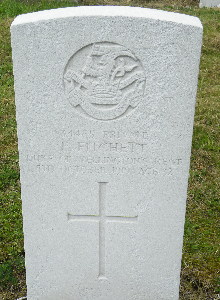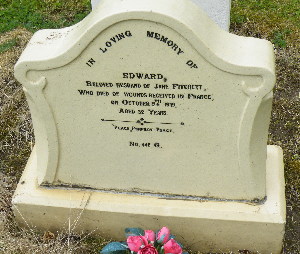
Photo: Dorothy Hall

Photo: Dorothy Hall
34485 Private
E. Fitchett
Duke of Wellington’s Regt.
5th October 1919 Age 32
A family headstone reads:-
In loving memory of
Edward
beloved husband of Jane Fitchett
who died of wounds received in France
on Oct. 5th 1919
aged 32 years
Peace Perfect, Peace
Pauline Priano has submitted the following:-
Edward Fitchett was born in Liverpool in about 1887, he was the youngest son of James Edward Fitchett (1857 Dartford, Kent) and Margaret (1848 Ireland - 1903 Bolton, Lancashire). His parents moved north just after their marriage as his four brothers and four sisters were all born in Lancashire. Edward’s father worked as an engine fitter (steam) and Edward at the age of 14 was also working at the colliery, below ground, as a drawer, taking the full tubs from the workplace to the haulage (the bottom of the shaft) and back again empty. A back breaking job for someone little more than a child.
When he was older, Edward continued to work at the mine as a hewer and was married November 20th 1909 to Jane Fell, born 1893 in Ferryhill. By 1911 they were living at 7, Fourth Cross Row, Ferryhill Station with their first born son, George Edward, (November 22nd 1910), who was 6 months old, followed in 1913 by Mary Hannah.
Edward enlisted as Private 18572 in the Yorkshire Regiment 6th Battalion, “D” Coy, December 12th 1914, for the duration of the war and was in England undergoing training until August 28th 1915. He was sent via Southampton to the Mediterranean August 29th 1915 and was wounded in Gallipoli, sustaining a gunshot wound to the ankle, November 12th 1915 and transferred to a hospital in Mundros. He was back in the field March 16th 1916. Less than three months later he was diagnosed with angina, sent to hospital in Port Said and was discharged back to base depot in Alexandria July 19th 1916. Edward was shipped out of Alexandria August 28th bound for France reaching Etaples September 8th, joining his regiment in the field September 20th 1916. He was hospitalised on two other occasions for minor ailments, however, October 3rd 1916 he received a gunshot wound to the head. This must have been a flesh wound as he was sent back to England the following day and given nine days leave to return home to 5, Fourth Cross Row, Ferryhill.
However, it was not until December 1916 that he returned to France assigned to the 7th Battalion, Yorkshire Regiment and then to the 3rd Battalion. He was hospitalised again, twice for cellulitis, caused by bacterial infection of an open wound to both his right hand and leg in February and March 1916, and in July 1917 was taken by the 51st Field Ambulance to the field dressing station suffering from P. U. O. pyrexia of unknown origin (fever). His relatives were kept informed by means of telegrams via headquarters in York. It was not until January 1918 that he was granted leave of 15 days and returned to his home until January 18th 1918.
After his return to the field he was transferred in February 1918 to the 12th Battalion Yorkshire Regiment. On July 27th 1918 he was again transferred as Private 34485, to the Duke of Wellington’s West Riding Regiment’s newly formed 5th Battalion, 186th Brigade of the 62nd Division. His division took part in the Battle of Tardenois, part of the Battle of the Marne, it was however during the first day of the Battle of Scarpe, August 26th 1918 that Edward received a gunshot wound to the shoulder and the lower back. He was repatriated via St Denis to a hospital in Halifax and on to the 5th London General Hospital, Lambeth, London. Edward underwent extensive treatment and there were a further two hospital transferrals until February 6th 1919 he was discharged from the Specialist Military Surgery Hospital in south west Yorkshire to be sent to Springfield War Hospital in Tooting, London on the grounds that he was not suitable for the previous hospital as the wounds he sustained had caused complete paraplegia.
Whilst in Tooting April 17th 1919 he was reviewed by the Invaliding Board and it was decided he should be sent to the War Hospital in Sunderland, the transfer took place April 24th. It was here, October 5th 1919, at 11.50 a.m., that Private 34485 Edward Fitchett died as a result of wounds sustained during active service, his wife was informed by telegram. A coroner’s report stated, “Cause of death G.S.W. back causing injury to the spinal cord”. His body was placed in a brass mounted coffin which cost £5/8/- (five pounds and eight shillings), there was a further charge of 10/- (ten shillings), for the removal of the coffin to the railway station.
Edward is buried in Duncombe Cemetery, Ferryhill, County Durham, G 448. Private Fitchett was awarded the British War Medal and the Victory Medal which were sent to his widow Jane at 5, Fourth Cross Row, Ferryhill.
His widow was awarded a pension for herself and two children. Jane remarried in Sedgefield, June 1922, to William D. Lackenby and died in Durham in 1950. Their son George Edward died in 1977 and Mary Hannah in 1980 in Durham.
In God’s safe keeping. Rest In Peace
Edward Fitchett is remembered at Chilton on C107.01, C107.04 and C107.12 and at Ferryhill StationF43.01

